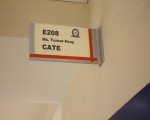by Caitlin Blackmon | staff writer
After senior Jordan Kramarsic leaves school, she goes directly to work. Since she has chosen to take the career prep class, her school day ends after fourth period- but the priorities don’t stop there.
“Depending on your schedule, you can get off after fourth, or you can get off after fifth, sixth, seventh, or eighth and just go to your job. So it [career prep class] gives you early release; it gives you more time to work,” Kramarsic said.
Career prep, also known as co-op, is a class in which students learn core business skills. It also requires students to work a part-time job in addition to attending school. This program enables students to gain knowledge and experiences that can then benefit them when they enter the work force later in life.
“You do different things based on how to handle money and finances, and how to dress for interviews, and how to go through and interview and how to go through the hiring process, and you learn how to do your taxes,” Kramarsic said.
Students who take this course see benefits down the road for their career – not just during school, according to career prep teacher Carrie Turner-Gray. Not only do they have something to put on college applications, but this experience can also be added to future job resumes when seeking a career.

“[Companies] know that the kids are actually gonna have a set of skills that they can take on with them,” Turner-Gray said. “And then once they leave college, and they put college prep on their applications, a lot of people think, ‘Oh, so they went to school and they maintained high grades and they worked a job.’ And so it looks really good for them.”
While career-prep has some advantages, it also requires hard work and can be time-consuming for some. Despite being able to get off earlier from school, you must work a certain amount of time in order to remain in the class.
“I think some of the disadvantages are that you’re required to work fifteen hours a week, average,” Turner-Gray said. “So, say it’s homecoming week and you don’t want to work that week. You have to make up those hours in one of the weeks in that marking period.”
In order to join the class however, there are certain prerequisites.
“Junior or senior, over 16 [years old]. They have to pass their classes; they can’t be failing things because they get put on probation, and they need to have a job that’s in an appropriate environment,” Turner-Gray said.
Overall, career prep provides students with job-training experience in a variety of jobs and work environments, according to Turner-Gray.
“A lot of businesses know about the career prep program, so it looks really good that you’re able to multi-task already,” Turner-Gray said. “And then, additionally, colleges look at that, and they say, ‘Oh, so they worked and went to school, so they’re not gonna be stressed out when they’re running all over the place.’”

